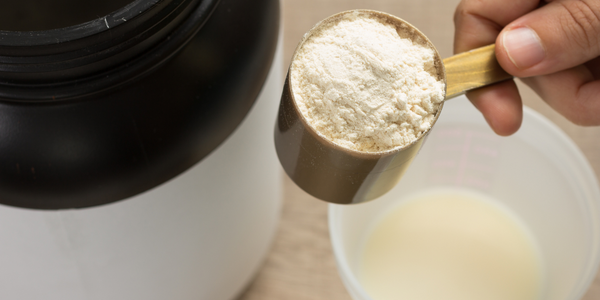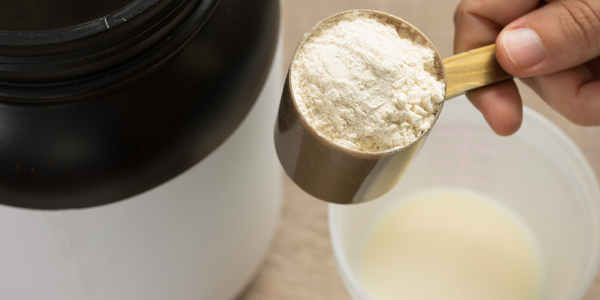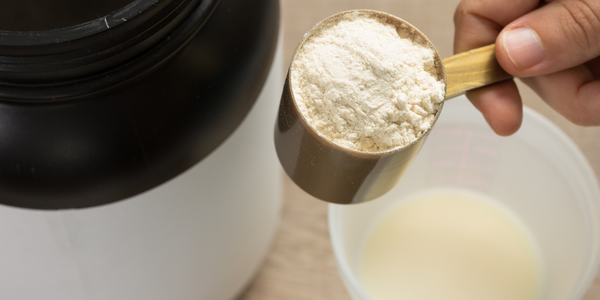Digestion plays a crucial role in determining how effectively the body can utilize nutrients. The faster and more efficiently protein is digested, the quicker it can be delivered to muscles for repair and recovery, especially after workouts.
Known for its richness in amino acids and high speed of absorption, whey protein is a popular supplement in use among athletes, gym goers, and even those with fitness and well-being goals who aim to grow muscle, speed recovery, or increase nutrition overall.
In this article, we will learn more about whey protein digestion and its time to help you optimize its timing and effectiveness for your fitness and nutritional goals.
Whey Protein Digestion
Whey protein is renowned for its quick digestion and absorption, making it a preferred choice for athletes and fitness enthusiasts. Once consumed, whey protein is broken down in the stomach by enzymes such as pepsin. From there, it moves to the small intestine, where it’s further broken down into amino acids. These amino acids are quickly absorbed into the bloodstream and transported to muscles for repair and growth.
Whey protein’s complete amino acid profile is a significant factor in its rapid absorption. It contains all nine essential amino acids, which the body cannot produce on its own. This makes whey protein a "complete protein," supporting muscle repair and overall recovery more efficiently than other protein sources.
Additionally, whey protein boasts high bioavailability, meaning a significant portion of its nutrients is efficiently absorbed and utilized by the body. Its fast absorption is unmatched, particularly when compared to slower-digesting proteins like casein, making whey protein an excellent choice for immediate muscle recovery, energy replenishment, and overall physical performance.
Digestion Time for Whey Protein
The digestion time for whey protein varies depending on the form consumed. On average, whey protein takes about 1 to 2 hours to digest, with an absorption rate of approximately 10 grams per hour. Let’s break down the different forms of whey protein:
-
Whey Protein Concentrate: Contains more lactose and fat, which may slightly slow down digestion. It is a good option for individuals looking to gain weight or maintain muscle mass, as it provides additional calories alongside high-quality protein. The lactose content also offers a natural source of energy and supports gut health for those without lactose sensitivity.
-
Whey Protein Blend: A combination of whey concentrate and isolate that balances digestion speed and nutrient delivery. This option suits individuals aiming for steady muscle recovery and growth, as it provides a moderate level of lactose and fat while still offering fast-absorbing protein. It’s versatile for pre or post-workout use and complements various dietary needs.
-
Whey Protein Isolate: Processed to remove most of the lactose and fat, allowing for faster digestion and absorption. It is ideal for people with lactose intolerance or those following a low-carb or low-fat diet. Its rapid absorption makes it perfect for post-workout recovery, helping to quickly replenish muscle protein stores and reduce muscle soreness.
After exercise, muscles are like sponges, ready to absorb nutrients. Consuming whey protein during this "anabolic window" ensures rapid nutrient delivery, aiding in muscle repair and growth.
Tips to Optimize Whey Protein Digestion
To make the most of whey protein’s benefits, follow these tips:
-
Choose the Right Time: The best times to consume whey protein are post-workout, at breakfast, or as a mid-day snack. These timings align with the body’s nutrient absorption peaks.
-
Pair with Suitable Liquids: Mixing whey protein with water or non-acidic liquids ensures smooth digestion. Avoid pairing it with citrus juices, which can slow down absorption.
-
Incorporate into Balanced Meals: Combining whey protein with complex carbohydrates and healthy fats creates a well-rounded meal that sustains energy levels.
-
Look for Enhanced Formulations: Supplements with additional ingredients like probiotics or Velositol can further enhance digestion and absorption. Probiotics promote gut health, while Velositol amplifies muscle protein synthesis.
In conclusion, whey protein’s fast digestion and absorption make it an ideal supplement for those looking to optimize muscle recovery, energy levels, and overall performance. On average, it takes just 1 to 2 hours for the body to digest whey protein, with whey protein isolate offering the fastest absorption. Choosing high-quality whey protein with added probiotics or innovative ingredients like Velositol can further enhance its benefits.
Whether you’re an athlete, fitness enthusiast, or simply someone striving for better health, incorporating whey protein into your diet can help you achieve your goals. By timing your intake and pairing it with balanced meals, you can make the most of this powerful supplement.



























 DOWNLOAD NOW
DOWNLOAD NOW
